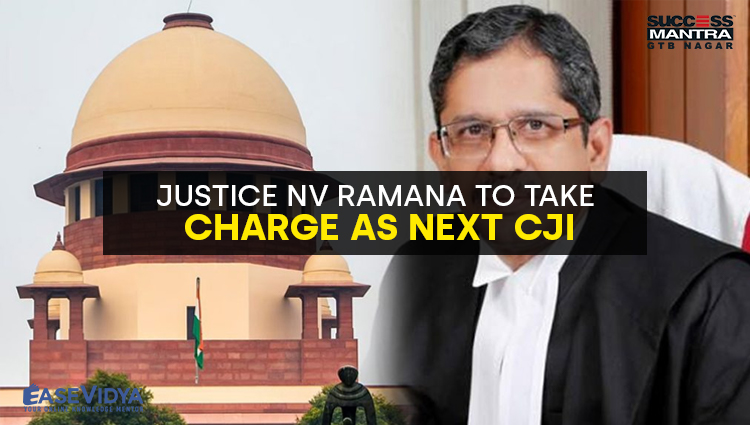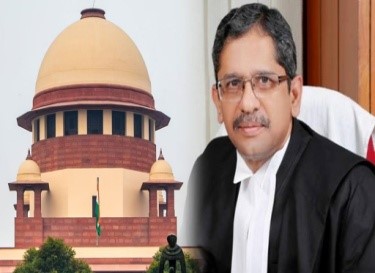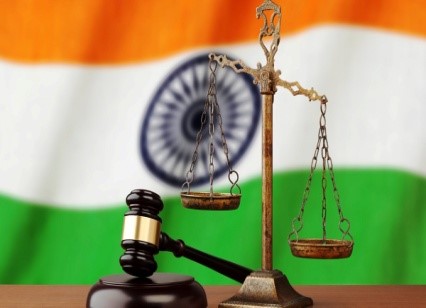
JUSTICE NV RAMANA TO TAKE CHARGE AS NEXT CJI
JUSTICE NV RAMANA TO TAKE CHARGE AS NEXT CJI

Chief Justice of India (CJI) SA Bobde in a letter to the central government has recommended appointing senior-most Supreme Court Judge Justice NV Ramana as the next Chief Justice of India. The Chief Justice of India SA Bobde is scheduled to retire from the position on April 23rd. Hence, it is likely that Justice N V Ramana will take over as the 48th Chief Justice of India on April 24th. Chief Justice of India (CJI) SA Bobde sends a letter to the Central government recommending to appoint senior most Supreme Court Judge Justice NV Ramana as the next CJI.
ABOUT JUSTICE NV RAMANA
Justice NV Ramana is currently the senior-most judge in the Supreme Court of India. He was previously serving as the Delhi High Court Chief Justice and acting Chief Justice of Andhra Pradesh High Court. He was elevated as a Supreme Court Judge on February 17, 2014. With a term of 8 years in the Supreme Court of India, he is now next in line to be Chief Justice of India with effect from 24 April 2021 after the retirement of Justice Sharad Arvind Bobde. Justice NV Ramana is due to retire on August 26, 2022. He has previously served as the President of the Andhra Pradesh Judicial Academy. He had enrolled as an advocate in February 1983 and specialized in criminal, service, constitutional and inter-state River laws.
He has also served as a panel counsel for several Government Organizations. Overall, he has practiced in the Andhra Pradesh HC, Central and Andhra Pradesh Administrative Tribunals as well as the Supreme Court in Civil, Criminal, Constitutional, Labour, Service and Election matters. He has been credited for presiding over path-breaking judgments in constitution, tax, arbitration and criminal law. He has previously headed SC benches that dealt with matters such as fast-tracking of trials in cases against legislators and restrictions imposed in Jammu and Kashmir after the abrogation of Article 370 of the Constitution. In March 2020, a bench headed by him rejected proposals to send petitions challenging the abrogation of Article 370 to a larger bench. He had also headed the constitution bench that had rejected the curative petitions filed by the convicts in the December 2012 gang rape and murder case, finally paving the way for their execution. As for his personal life, he was born into a humble family of agriculturalists in Ponnavaram Village, Krishna district in undivided Andhra Pradesh.
APPOINTMENT OF JUDGES OF SUPREME COURT

The judges of the Supreme Court are appointed by the President. The CJI is appointed by the President after consultation with such judges of the Supreme Court and high courts as he deems necessary. The other judges are appointed by the President after consultation with the CJI and such other judges of the Supreme Court and the high courts as he deems necessary. The consultation with the chief justice is obligatory in the case of appointment of a judge other than Chief justice.
Appointment of Chief Justice From 1950 to 1973: The practice has been to appoint the senior most judge of the Supreme Court as the chief justice of India. This established convention was violated in 1973 when A N Ray was appointed as the Chief Justice of India by superseding three senior judges. Again in 1977, M U Beg was appointed as the chief justice of India by superseding the then senior-most judge. This discretion of the government was curtailed by the Supreme Court in the Second Judges Case (1993), in which the Supreme Court ruled that the senior most judge of the Supreme Court should alone be appointed to the office of the Chief Justice of India.
Collegium System: Collegium system was born through “three judges case” and it is in practice since 1998. It is used for appointments and transfers of judges in High courts and Supreme Courts. There is no mention of the Collegium either in the original Constitution of India or in successive amendments.
Qualifications of judges: A person to be appointed as a judge of the Supreme Court should have the following qualifications:
- He should be a citizen of India.
- He should have been a judge of a High Court (or high courts in succession) for five years;
- He should have been an advocate of a High Court (or High Courts in succession) for ten years;
- He should be a distinguished jurist in the opinion of the president.
- The Constitution has not prescribed a minimum age for appointment as a judge of the Supreme Court.
REMOVAL OF JUDGES OF SUPREME COURT
A judge of the Supreme Court can be removed from his office by an order of the President. The President can issue the removal order only after an address by Parliament has been presented to him in the same session for such removal. The address must be supported by a special majority of each House of Parliament (i.e., a majority of the total membership of that House and a majority of not less than two-thirds of the members of that House present and voting). The grounds of removal are two—proved misbehavior or incapacity.
The Judges Enquiry Act (1968) regulates the procedure relating to the removal of a judge of the Supreme Court by the process of impeachment: No judge of the Supreme Court has been impeached so far. Impeachment motions of Justice V Ramaswami (1991–1993) and Justice Dipak Misra (2017-18) were defeated in the Parliament.
TEST YOURSELF
Q.1 Which of the following judge's name is recommended by the current CJI SA Bobde to be as the next Chief Justice of India?
- Justice NV Ramana: ANSWER
- Justice Krishna Murari
- Justice DY Chandrachud
- Justice U.U Lalit
Q.2 Which of the following given qualifications is wrong for being a judge in the Supreme Court?
- It is compulsory to be a citizen of India.
- He should be a respected jurist in the eyes of Parliament: ANSWER
- Must be a judge in the High Court for at least 5 years
- He should be a lawyer in the High Court for at least 10 years
Q.3 Which of the following authorities have the power to remove the Judge of the Supreme Court?
- Chief Justice of the Supreme Court
- Only President
- Only Parliament
- Both Parliament and President: ANSWER
Q.4 Which of the following was appointed as the Chief Justice of India by superseding three senior judges which violated the principle for the first time of appointing the senior most judge of the Supreme Court as the CJI?
- Justice Mirza Hameedullah Beg
- Justice Mohammad Hidayatullah
- Justice Ajit Nath Ray: ANSWER
- Justice P. N. Bhagwati
Q.5 In 2015, which commission has been brought by the government into force along with a constitutional amendment act to appoint members to the higher judiciary replacing the collegium system?
- National Collegium Commission
- National Judicial Appointments Commission: ANSWER
- Judicial Collegiums Commission
- Judicial Commission












0 Comment